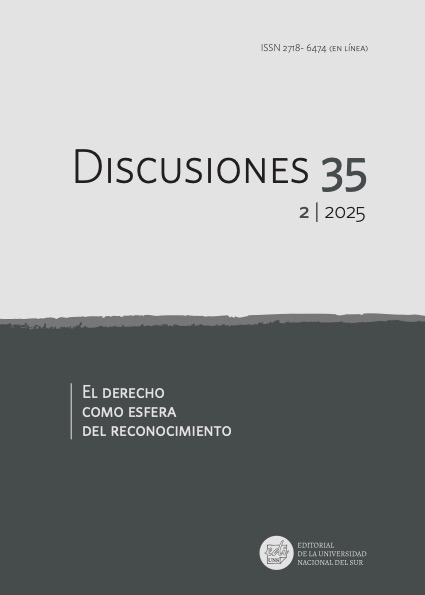Recognition Theory as Critical, Social and Social Struggle Theory
An Application to the Critical Analysis of Feminized Domestic Work
DOI:
https://doi.org/10.52292/j.dsc.2025.4615Keywords:
Recognition theory, critical theory, social theory, domestic work, principle of equalityAbstract
The article presents the theory of recognition as a social theory of the differentiation of action spheres, as a theory of social struggles for recognition, and as a critical theory. This distinction allows to identify, among other things, the place and function of institutions and moral principles in each of these theories. With these distinctions in mind, the phenomenon of feminized domestic work is studied from the point of view of the relationship between the spheres of love, law, and social esteem, showing that the interesting and rich part of the analysis lies precisely in the intersection of these spheres. From there, certain useful conclusions are drawn for the struggles for recognition and the critical theory of society. One of them lies in the primacy of the egalitarian principle, over that of love and achievement, in the critical treatment of said phenomenon.
Downloads
References
Adorno, Th. y Horkheimer, M. (1944). Dialektik der Aufklärung, Amsterdam: Querido Verlag.
Allen, A. (2017). The End of Progress: Decolonizing the Normative Foundations of Critical Theory. Nueva York: Columbia University Press.
Basaure, M. (2021). Matrimonio igualitario. Reconstrucción y posición frente a una controversia filosófica, política y jurídica. ALPHA: Revista De Artes, Letras y Filosofía, 1(52), 111-131.
Basaure, M. (2014). Axel Honneth and Luc Boltanski at the Epicentre of Politics. En S. Susen y B. Turner (eds.). The Spirit of Luc Boltanski. Essays on the ‘Pragmatic Sociology of Critique’ (pp. 391-411). Londres: Anthem Press.
Basaure, M. (2011a). In the epicenter of politics: Axel Honneth’s theory of the struggles for recognition and Luc Boltanski and Laurent Thévenot’s moral and political sociology, European Journal of Social Theory, 14(3), 263-281.
Basaure, M. (2011b). Continuity through rupture with the Frankfurt school: Axel Honneth`s theory of recognition. En G. Delanty y S. Turner (eds.), Routledge International Handbook of Contemporary Social and Political Theory (pp. 99-109). Nueva York: Routledge.
Basaure, M. (2011c). Axel Honneth et le multiculturalisme. Droit & Société, 78, 339-353.
Basaure, M. (2009). Foucault et la Psychanalyse. Il faut être juste avec Freud. París: Éditions Le Félin.
Boltanski, L. (2009). De la critique. Précis de sociologie de l’emancipation. París: Gallimard.
Boltanski, L. (1990). L’amour et la justice comme compétences. Trois essais de sociologie de l’action. París: Métaillé.
Bourdieu, P. (1972). Esquisse d’une théorie de la pratique. Ginebra: Droz.
Celikates, R. (2009). Kritik als soziale Praxis. Gesellschaftliche Selbstverständigung und kritische Theorie. Frankfurt/Main-Nueva York: Campus.
Dalla Costa, M. y James, S. (1972). The Power of Women and the Subversion of the Community. Bristol: Falling Wall Press.
Durkheim, É. (1893). De la division du travail social. París: Félix Alcan.
Federici, S. y Fortunati, L. (1984). Grande Calibano: Storia del corpo sociale ribelle nella prima fase del capitale. Milán: Franco Agelini.
Federici, S. (2004). Caliban and the Witch. Brooklyn: Autonomedia.
Folbre, N. (2001). The Invisible Heart: Economics and Family Values. Nueva York: The New Press.
Forst, R. (2007). Das Recht der Rechtfertigung: Elemente einer konstruktivistischen Theorie der Gerechtigkeit. Frankfurt/Main: Suhrkamp.
Habermas, J. (1981). Theorie des kommunikativen Handelns (Vol. 2). Frankfurt/Main: Suhrkamp.
Habermas, J. (1968). Technik und Wissenschaft als Ideologie. Frankfurt/ Main: Suhrkamp.
Hegel, G. (1821). Grundlinien der Philosophie des Rechts. Berlin: Nicolaische Buchhandlung.
Hegel, G. (1807). Phänomenologie des Geistes. Bamberg/Würzburg: Joseph Anton Goebhardt.
Hochschild, A. (1989). The Second Shift. Nueva York: Viking Penguin.
Honneth, A. (2015). Die Idee des Sozialismus. Versuch einer Aktualisierung. Frankfurt/Main: Suhrkamp.
Honneth, A. (2011). Das Recht der Freiheit. Grundriß einer demokratischen Sittlichkeit. Frankfurt/Main: Suhrkamp.
Honneth, A. (1995). Zwischen Gerechtigkeit und affektiver Bindung: die Familie im Brennpunkt moralischer Kontroversen. Deutsche Zeitschrift für Philosophie: Zweimonatsschrift der internationalen philosophischen Forschung, 43(6), 989-1004.
Honneth, A. (1992). Kampf um Anerkennung. Zur moralischen Grammatik sozialer Konflikte. Frankfurt/Main: Suhrkamp.
Honneth, A. y Fraser, N. (2003). Umverteilung oder Anerkennung? Eine politisch-philosophische Kontroverse. Frankfurt/Main: Suhrkamp.
Honneth, A. y Hartmann, M. (2004). Paradoxien des Kapitalismus. Ein Untersuchungsprogramm. Berliner Debatte Initial, 15(1), 4-17.
Horkheimer, M. (1937). Traditionelle und kritische Theorie. Zeitschrift für Sozialforschung, 6(2), 245-294.
Iser, M. (2008). Empörung und Fortschritt: Grundlagen einer kritischen Theorie der Gesellschaft. Frankfurt/Nueva York: Campus.
Kant, I. (1797). Die Metaphysik der Sitten. Königsberg: Friedrich Nicolovius.
Luhmann, N. (1984). Soziale Systeme: Grundriß einer allgemeinen Theorie. Frankfurt/Main: Suhrkamp.
Marcuse, H. (1964). One-Dimensional Man: Studies in the Ideology of Advanced Industrial Society. Boston: Beacon Press.
Merton, R. (1957). Social Theory and Social Structure. NuevaYork: The Free Press.
Parsons, T. (1951). The Social System. Illinois: Free Press.
Rancière, J. (1990). Aux bords du politique. París: Osiris.
Ricœur, P. (2004). Parcours de la reconnaissance. París: Stock.
Rivers, C. y Barnett, R. (2013). The New Soft War on Women: How the Myth of Female Ascendance Is Hurting Women, Men—and Our Economy. Nueva York: Tarcher/Penguin.
Roggerone, S. M. (2025). Justicia y teoría social contemporánea, o el lugar del derecho en la obra de Axel Honneth. Discusiones, 35(2).
Thévenot, L. (2006). L’action au pluriel. Sociologie des régimes d’engagement. París: La Découverte.
Weber, M. (1921). Wirtschaft und Gesellschaft: Grundriss der verstehenden Soziologie. Tübingen: Mohr.
Published
How to Cite
Issue
Section
License
Copyright (c) 2025 Mauro

This work is licensed under a Creative Commons Attribution-NonCommercial 4.0 International License.
Discusiones does not withhold rights of reproduction or copyright. Consequently, authors may share the final versions of publications.


